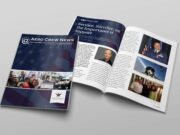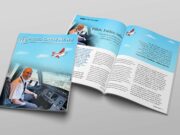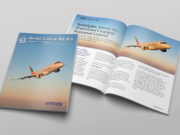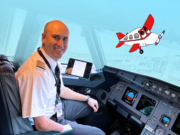
Finally, you get to a career airline after years and many hours working as a flight instructor or a regional pilot. Who are you? What do you do? How are you? Chances are that you will bring up your work when answering these questions. Do you let your work determine how you feel and who you are? What if you derive your entire identity from your career? What if your professional identity determines everything? You want to avoid thinking about what happens if you are furloughed or retire. Who are you without your job?
Your job and career are essential parts of your identity, especially for pilots, traveling frequently, being away from home, surrounded by other pilots, having social support connected to your job, and even wearing a uniform. Society emphasizes that success depends on how well we do at our jobs. However, the work you do is only one of your various identities. We all have different identities and roles that consist of parts built up from personal and social elements. The trap occurs when you associate your entire identity and self-worth with your work, and it becomes difficult to separate the idea of meaningful work from a meaningful life.
Many pilots experience a lack of accomplishment when it comes to career advancements. Often, they will reach the next career step, and rather than feeling pride in it, they look for the next step and feel a sense of unrest. Along the way, they have sacrificed a lot, increasing the chance that they over-identify themselves as pilots.
Cons
When people invest a disproportionate amount of time and energy in their careers, the boundaries between work and private life can blur. This phenomenon is called “enmeshment,” a form of identity entanglement. Over-identification with work mainly happens to people who do not have a nine-to-five job and set their hours or have irregular hours.
Enmeshment can jeopardize your personal life and contacts unrelated to your job. It consumes one's time and energy, leaving less opportunity for involvement in other hobbies and interests. This can make building connections with people outside of work more challenging.
Moreover, your self-esteem takes a big hit if you see your job as the defining part of your identity. Likely, the successes and setbacks within your career or the industry will directly impact your self-worth. Since the aviation industry is consistently susceptible to change and affected by external factors, there is a likelihood that you will have to adjust your route and expectations as well. When you switch airlines or are furloughed, this can lead to an identity crisis.
Test Yourself
Is your professional identity dominant? According to psychologist Janna Koretz, you can ask yourself the questions below to determine if you are too entangled with your job.
- How often do you think about your job outside of work?
- Do you frequently have work-related thoughts?
- With others, is it challenging to participate in conversations that are not about your work?
- How do you describe yourself? How much of this description is related to your position, title, or company?
- Are there other ways you would describe yourself?
- With people you just met, how quickly do you tell them about your job?
- Where do you spend most of your time?
- Has anyone ever complained to you about spending too much time at work?
- Do you have any hobbies outside work that are not directly related to work-related skills and abilities?
- Do you spend time training other parts of your brain?
- How would you feel if you could no longer continue with your profession? How difficult would this be for you?
If the answers to these questions cause concern that you are too enmeshed with your job, you can use some of the following steps to restore and change your self-esteem.
1. Develop Connections Unrelated to Work
Investing time in relationships with people who have nothing to do with your work life helps encourage you to develop interests, hobbies, and connections. Having other experiences can be very beneficial; this will help remind you of who you are regardless of professional setbacks or accomplishments. In addition, setting goals for dedicated time to develop these hobbies/interests/friendships is helpful.
2. Leave the Job at Work
It is okay to talk about work and vent frustrations. However, be mindful of how much time this consumes on your days off and how it affects your mood. A potential compromise is restricting yourself to half an hour after coming home or waiting until the day after to indulge in work-talk with your partner or friends, or participate in work-related forums. We need to get to a place of acceptance where we need to talk about work but also understand that too much is not helpful, especially when building an identity outside of flying.
3. Redefine Success
In today's society, we are conditioned to think that success equals money and status. But what does success mean to you? Having more time with your family, living a fulfilled life, feeling comfortable in your skin, and making meaningful connections with others and ourselves can be other examples of success. Defining success by your values will undoubtedly shift how you view success and mental health. It is okay to derive part of your self-worth from professional achievements, after all, you have worked hard to reach this point in your career. However, success comes in many different forms, and your achievements in your personal life matter, too.
4. Reassess your Values
We all have our own unique set of values – things that we find important in life. Values are an essential part of our identity and remain mostly the same. Honesty, creativity, freedom, autonomy, and justice are examples of values. Sometimes, people lose sight of their primary values when life and day-to-day stressors get in the way. Therefore, it is essential to check in with yourself now and then. Has your loyalty to your flying career pulled you away from your core values? If so, reassess your values and let them drive your professional and personal goals again.
5. Exercise: Value Exploration
Step 1
Reflect on what you did and enjoyed doing when you were young. Grab a piece of paper and write about events and activities that fulfilled you in your childhood. If you write down five (or more) memories, you might recognize a pattern. More presently, what activities or moments gave you energy today? These can be big or small; for example, feeling fulfilled and happy when you spend time outside with your partner or child. Write them down. Does this align with what you enjoyed when you were young? What choices have you made that aligned with your interests when you were young?
Tip: Seek out areas and activities that help bring clarity. For example, exercise, meditation, or spending time in nature can be helpful ways to gain new insights about yourself.
Step 2
Once you have written down memories and fulfilling moments, reflect on why those moments are valuable to you and which values align with them. Reflecting on your values can give direction to your life. Being true to your values gives you a higher purpose and helps you set priorities and fulfill goals.
Ask Yourself These 5 Questions:
- What do I want my life to be about?
- What kind of relationships do I want to build?
- What do I find important?
- How do I feel most of the time?
- What kinds of situations make me feel truly alive?
Final thoughts
It is wonderful to be passionate about being a pilot. However, work should add meaning to your life, but work should not be the meaning of your life. If you feel that your professional identity is affecting your self-esteem and overall well-being, it is time to reel it back. Keep a healthy dose of perspective by distinguishing between who you are and what you do. Remember that you exist out of more than your professional identity. You can seek a coach or therapist to help you explore various parts of your identity and implement changes.
Another way to further develop insight is by asking trusted friends to list your qualities and talents. In addition, online self-tests about values and identity are available, for example, Daniel Ofman's Core Quadrants. When you have a strong sense of self, you will gain more confidence, you will perform better in your different roles, and you will be able to live a more wholesome life.
Resources
Why we define ourselves by our jobs – by Kate Morgan
https://www.bbc.com/worklife/article/20210409-why-we-define-ourselves-by-our-jobs
What Happens When Your Career Becomes Your Whole Identity – by Janna Koretz
https://discboulevard.com/en/blogs/core-quadrant-by-daniel-ofman/





















































